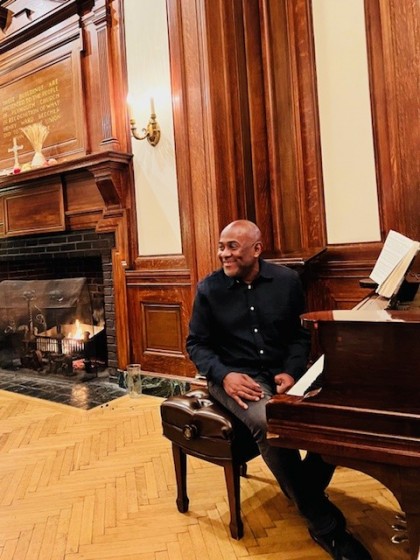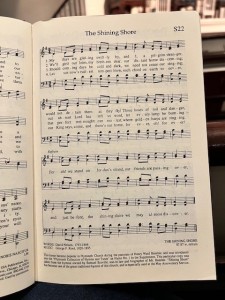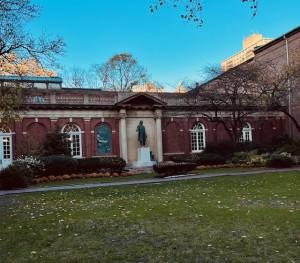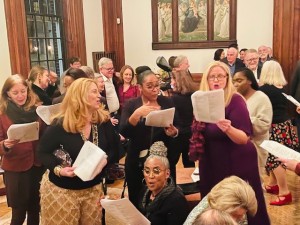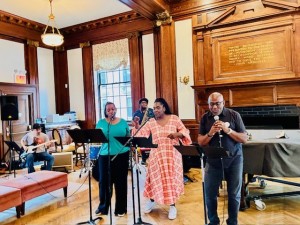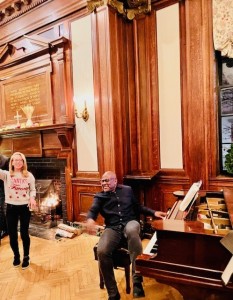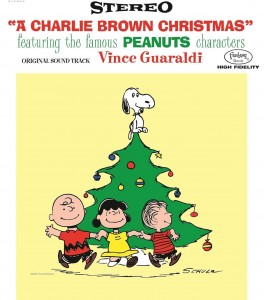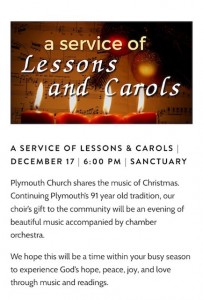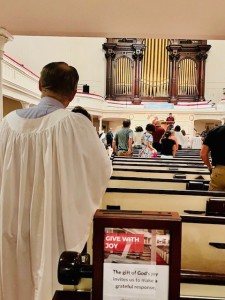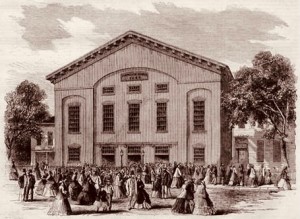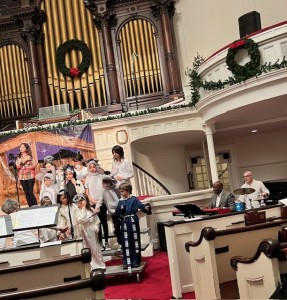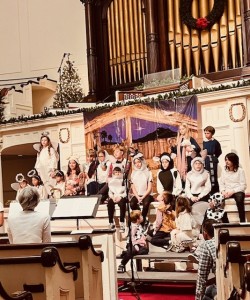Before I ever met Raymond Trapp, I asked him a favor. I was hoping he could help me with a sing-along after the 175th Anniversary celebration dinner of Plymouth Church last November. He was the recently-named interim Minister of Music. “Just a few songs, we could sing around the piano,” I’d said. He quickly agreed. I don’t know if he expected a list of praise and worship music, but a few days before the dinner, I sent him my list: Neil Diamond’s “Sweet Caroline” was number one—a personal favorite. Next up was ABBA’s “Dancing Queen.” I’d also added Broadway favorites like “Seasons of Love” from Rent, “Age of Aquarius/Let the Sun Shine In” from Hair and selections from Oklahoma, Mame and more. There was Billy Joel’s “Piano Man” and several Beatles tunes plus Journey’s “Don’t Stop Believin’.” Pretty much the only hymn was the rousing The Shining Shore.
If Raymond was shocked, he didn’t say. But I was delightfully surprised on the day of the event as I watched him unload a keyboard and hold the door for a drummer and guitarist. He’d brought a band of friends to get us through. They played all of the requests with joy and humor. He didn’t say a word about how I shrieked along like bad karaoke. The event was fun. I don’t think that room was rocking that much since Mrs. Beecher’s sewing circle got into the eggnog in 1849—-OK, just kidding, I made that up. Sorry, Mrs. Beecher. But it was a memorable 175th anniversary jubilee and whomever is planning the 200th should take note.
Raymond has now been Plymouth’s permanent Minister of Music for nearly a year and he’s hosted his own sing-alongs. At October’s Yankee Fair, he featured three singers plus his jazzy band friends, keeping “Dancing Queen” and adding a favorite finale from Grease “We Go Together” (you know, John Travolta and Olivia Newton-John: We go together Like rama lama lama ka dinga da dinga dong.)
We entered Advent with him at the piano again, with kids and adults singing along to favorite hymns. Then Raymond, undaunted by a seventh grader’s request of Mariah Carey, lead all of us, very few trained choristers, I should note, in “All I Want for Christmas is You.” I’m not sure Mariah needs to worry about her royalties, but I’ll bet we had more fun than she does singing it. With his trademark humor and spunk, we ended with a rousing “Feliz Navidad.”
Raymond is a delightful musician and if you haven’t heard him and the Plymouth Choir, there are two chances this weekend. On Sunday at 11:00 a.m., the theme is Joy and he and the choir will offer the classic “Joy to the World” followed by “Christmas Time is Here” by Vince Guaraldi and Lee Mendelsohn—what my family calls “Charlie Brown music”—with sax, drums and keyboard.
On Sunday night, December 17, the annual and long-standing Plymouth service of Lessons and Carols is free and open to the public at 6:00 p.m. There will be some singalong, some traditional carols, some guest musicians and chamber orchestra and lots of joy and wonder of the Christmas season. Do not miss that. (And if you do, there’s community caroling December 21 at 6 p.m. and three services on Christmas Eve—11 a.m., 4 p.m. for families and 6 p.m. for all.)
To my ear, Raymond would be perfect for a barroom or Jazz at Lincoln Center, but his actual credentials in chorale and sacred music are more impressive. He’s a Colleague of the American Guild of Organists and was elected as the first African American Dean of the Brooklyn Chapter. He has a B.A. in Music from Hunter College and a Master’s Degree in Sacred Music/Choral Conducting from Westminster Choir College, Princeton, New Jersey. Raymond was formerly director of music in East Flatbush, Brooklyn at Vanderveer Park United Methodist Church and served multiple terms as Worship and Music Director for the UMC national conference.
His training and interests fit in with Plymouth’s rich musical history. Back in 1855, Plymouth’s Rev. Beecher, his brother Charles and John Zundel, the widely known church organist created the “Plymouth Collection” known as America’s first hymnal. Plymouth’s website notes this:
Beecher wanted what he called “a singing church.” He concluded that the way to accomplish this was to put the hymns–both the words and the music–into the hands of the congregation. What many experts also consider revolutionary was Beecher’s concept of “usefulness,” bringing together popular and singable music from many denominations. Joining Beecher in creating The Plymouth Collection were his brother, Charles Beecher, and John Zundel, the widely admired organist at the Church.
In the fall of 1855, The Plymouth Collection entered the pews of Plymouth, and full congregational singing became the church’s hallmark. News spread quickly to churches of other faiths, and it was not long before Beecher’s hymnal carried congregational singing far beyond its Brooklyn roots.
All I know is, over here in 2023, I heard Raymond and drummer Chris DeRosa jamming with glee at last weekend’s Christmas pageant.
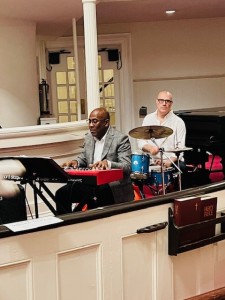
I’ve also heard Raymond and the present-day choir practicing my favorite Christmas song—“Do You Hear What I Hear?” In these dark days, I need to hear singing and joy and “voices as big as the sea.” I can’t wait to pitch Raymond on a broad community sing along to warm up the coming 2024 winter chill, but until then, as this community rolls into Christmas, come and hear what I hear too.
Peace on Earth.
Follow the Brooklyn Heights Blog and follow me at Insta: kostercaroline75 and X: @aikenkoster © 2023 Caroline Aiken Koster. All rights reserved.
